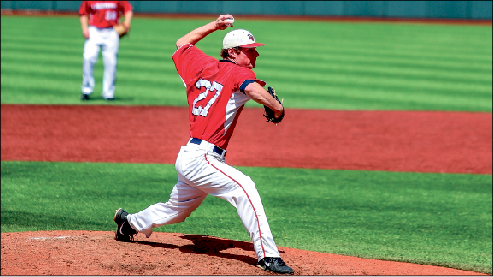Editorial: Life beyond the field

For former student athletes, the job search in their field of study can be tough
Student-athletes commit four, potentially five, years of their college careers to training, practicing and competing in a specific sport. Committing to training nearly year-round means less time for athletes to gain experience and credibility in their field of study. However, sometimes the character and skills acquired through a life in athletics can override the lack of experience necessary to secure internships or jobs upon graduating.
As with many things in life, there are benefits to being a student athlete; but with every advantage there is a disadvantage. One of these drawbacks is the unequal amount of time devoted to training for a sport versus training for a job after college.

Prepared – Blake Fulgham compared job hunting to earning a spot in rotation. Photo credit: Courtney Russo
“I know for myself, I didn’t really have time to do many extracurricular activities outside of my school work and playing my sport, and I definitely didn’t get to work in my career field until after I graduated,” former Liberty field hockey player Jordan Richardson said. “So when I started looking for jobs and internships, I didn’t really have too much other than being a student-athlete to put on my resumes. So I had to learn to market myself.”
Most internships and jobs, even at entry-level positions, require two to three years of experience in that specific field. This requirement proves to be extremely difficult for athletes, whereas their classmates may have more opportunities at their disposal to engage in clubs, extracurricular activities and part-time jobs that may benefit their post collegiate job search.
“I have been told I have the qualities of a great worker and would be a great fit if only I had more experience,” former Liberty baseball pitcher Blake Fulghum said. “And while I was trying to be the best baseball player I could be, my fellow classmates used that time to be the best in the digital media field. It’s funny to think about because I would see them sometimes working the cameras at my own games.”
Despite the struggles some athletes may encounter because of their commitment to athletics, there are beneficial skills achieved and valuable lessons learned that build an athlete’s character. So although employers may search for polished resumes with significant experience, a student-athlete’s character speaks louder than hours spent in an office.
“Some of the most crucial skills you learn are time management, being able to work effectively under pressure and working as a team,” former Liberty women’s lacrosse player and current assistant coach Nina Dunay said. “You learn how to work with a diverse group of people, how to grow and live outside of yourself and work with people who have different strengths and weaknesses.”
In other words, athletes take part in forced interaction on a daily basis with their teammates. They must learn to work together with the people around them to accomplish one goal.
“Character development in the end is something that is lifelong,” Richardson said. “Regardless of how much experience you have, if you don’t have the character to back it up no one will hire you because if you’re not trustworthy or don’t persevere when you’re put through trials there’s no reason to hire you.”
According to Richardson, by applying the lessons learned on the field to off the field circumstance, athletes have an advantage over other students. When they graduate college they understand how to remain calm and work more effectively than students who did not experience the added pressure of athletics in addition to school.
“Getting a job is like getting a spot in the pitching rotation,” Fulghum said. “You have to work harder than the next guy. You need to show you actually want the job and are confident to do it and lastly you need to perform. Confidence is one of the biggest aspects of both, and I learned that from baseball.”
Richardson, who works as Liberty’s Student-Athlete Development Coordinator, said there are more opportunities than ever for athletes to attain professional development skills before graduating and entering the workforce. Liberty’s Athletic Department offers four-year seminar plans, resume-building workshops and is currently preparing to offer a career fair specifically for student-athletes.
At the end of a student-athlete’s career in college, they may graduate and find more difficulty in initially obtaining jobs and internships because of the little exposure they have received in their desired profession. However, all of these former athletes said they did not regret spending their time competing in a sport. The memories, lessons and skills gained have prepared them for life after college in a way that no internship could have done.
“Being a student-athlete gave me a clearer vision of what I wanted to do,” Dunay said. “Being an athlete benefitted me in the long run because it was the on-the-field experience that got me where I am right now. I feel like I got more out of simply being a student-athlete than from any of my internships.”
BRITTON is a sports reporter.
